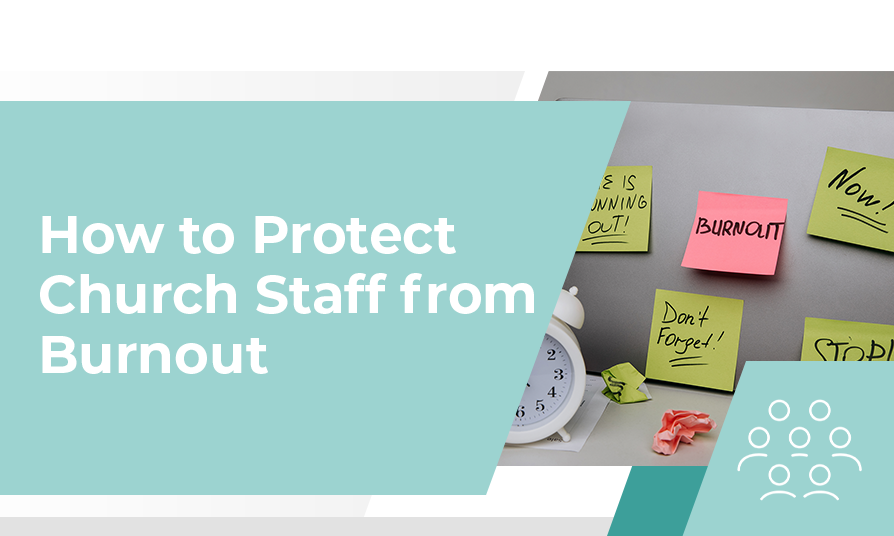As leaders, sometimes we need to protect our team members from themselves. The individuals who regularly stay late to wrap up a few tasks, who take on the toughest assignments, and practically live at the church need your help. While their dedication and work ethic is admirable – ministry is a marathon, not a sprint. Running at a sprinter’s pace will keep team members from being able to stay healthy and strong over the long haul. Thankfully, it doesn’t require significant costs or efforts to protect church staff from burnout.
Here are seven tips to protect church staff from burnout:
Tip #1: Set clear expectations
- Does each member of your team have a documented job description?
- Do they know what you expect from them, and what a “win” looks like for their role?
If not, they’re trying to guess what you want and what success looks like. It’s really hard to hit a target you can’t see. Don’t make them guess. Document a job description and include key measurements or examples of what you expect to see.
Tip #2: Check in regularly
Conduct a weekly one-on-one meeting with those who report to you.
- Find out what they worked on the last week and what they have planned for the next 1-2 weeks.
- Answer any questions they may have, or clarify what it is you’re looking for from them on a specific project.
- If your staff member looks exhausted or seems frustrated, try to find out what’s going on.
Tip #3: Go home on time
Here’s the deal: Your staff members probably feel like they can’t leave the office until you do.
He’ll think I’m not willing to put in the hours.
She’ll think I’m slacking off if I leave at 5pm.
Go home and save your team from feeling like they have to stay late. This also sets an example for them that spending time with family is more important than finishing up another task.
They’re watching how you manage your time including how you prioritize your family and your own health. Set a positive example for them to follow.
Tip #4: Ask questions
When you assign a task or new project to a staff member, ask a few questions before you let them go.
- Do you have any questions about this or need any additional information?
- How long will it take to make this change?
- Do you have the resources you need to do this? If not, what do you need?
Also, if you’re making a last-minute change, please ask about the impact of that change.
Some staff members will start working on it without telling you how much additional effort is required because they don’t want to come across as questioning your decision.
However, you may not realize that what you just asked him to do will take five hours of rework with an already full schedule before the deadline. If it’s still important enough to make the change, then let him know why it’s important. If that change isn’t worth several hours of rework and staff staying late at the office, then discuss other options to achieve the goal without wreaking havoc on the team.
Tip #5: Create a culture where it’s okay to ask for help and raise concerns
Make sure your staff members know that it’s safe to say, “I’m drowning over here and need help!” Now, of course, they should manage their time wisely and work hard while at work. Assuming that’s the case, realize they’re taking a risk when asking for help.
Will he think I’m not capable?
Will this make her question my dedication to the church?
Address their concerns and let your team know you’d rather them ask for help before they fall behind schedule or burn out.
Tip #6: Don’t send messages after hours
I know it’s convenient to send off a quick text message or email at 8pm when you think of a question for your youth pastor. However, that sends a subtle message that you expect a response right away.
Do you want your team responding to messages late at night OR spending time with family?
Instead, enter a note on your phone or write it down somewhere so you won’t forget the question. You could even draft the email but wait until the next morning to send it out.
Also, consider the message this sends to your team. Even though you may have had a quick thought about work before bedtime stories with your kids, they don’t know that. They may think you’re working late on a regular basis. Then they’ll think they should be working those hours as well.
Tip #7: Provide training
Your team may need training on how to manage their time and energy more effectively. They may need training on certain skills needed for their job. Training can equip someone to be more efficient and produce higher quality results. We all feel inadequate for an assignment on occasion. By offering training and guidance as needed, you’re supporting a team who’s working to support you and the vision of the church.
While your staff members are responsible for how they approach their work and manage their time, you can have a significant impact on their longevity in ministry. Use these tips to protect church staff from burnout and help them thrive in ministry for the long haul.



